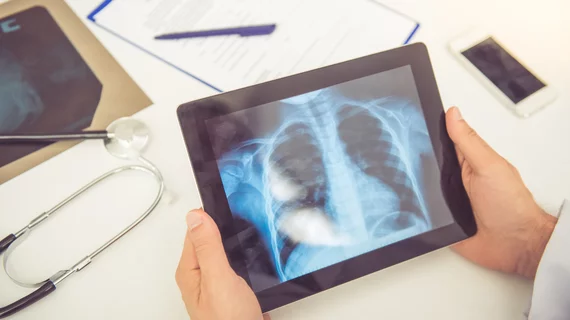ACR launches new digital radiography pilot to standardize radiation dose variation in chest exams
The American College of Radiology is launching a new registry to track and compare radiation dose patterns across healthcare practices utilizing digital radiography, the group announced Tuesday.
Radiography is the most commonly used ionizing imaging tool, with more than 275 million exams performed in the U.S. each year. Yet radiation dosage can differ by organization, such as chest X-ray for pneumonia, which may vary by 10-fold or more, experts explained in JACR.
The ACR Dose Index Registry in digital radiography or ACR DIR-DR will gather anonymous exam records to compare dose indices between healthcare facilities. Such data can be transmitted directly from a scanner or PACS, recently renamed MIMPS, via the ACR’s Transfer of Imaging and Data system.
“The purpose of the ACR DIR DR is to document practice patterns and, over time, establish benchmarks for common examinations,” Steven Don, MD, a Mallinckrodt Institute of Radiology physician, and colleagues with the ACR explained. “Facilities can then compare their data to regional and national aggregate data and decide if changes in their acquisition techniques are needed to improve patient care.”
Similar ACR-led efforts have proven successful for computed tomography scanning. The DIR for CT has amassed more than 50 million exams from upwards of 2,1000 facilities. Dose indices are compiled quarterly and participating locations receive reports on their metrics and comparisons with other facilities.
As a result, diagnostic reference levels and achievable doses have been established for the 10 most common adult CT exams, and a smaller effort to standardize pediatric abdomen and pelvic CT has also been well received.
First up in replicating this success will be a new pilot project to identify and correct radiography workflow and technical issues, including problems gathering data and remedying exam protocol naming conflicts, Don and co-authors noted. The project will offer a snapshot into practice patterns and help inform future feedback reports for participating organizations.
Healthcare facilities interested in taking part should contact Steven Don (Steven.Don@wustl.edu) or the NRDR Registry Support (https://nrdrsupport.acr.org).
You can read more about the pilot project in the Journal of the American College of Radiology.

